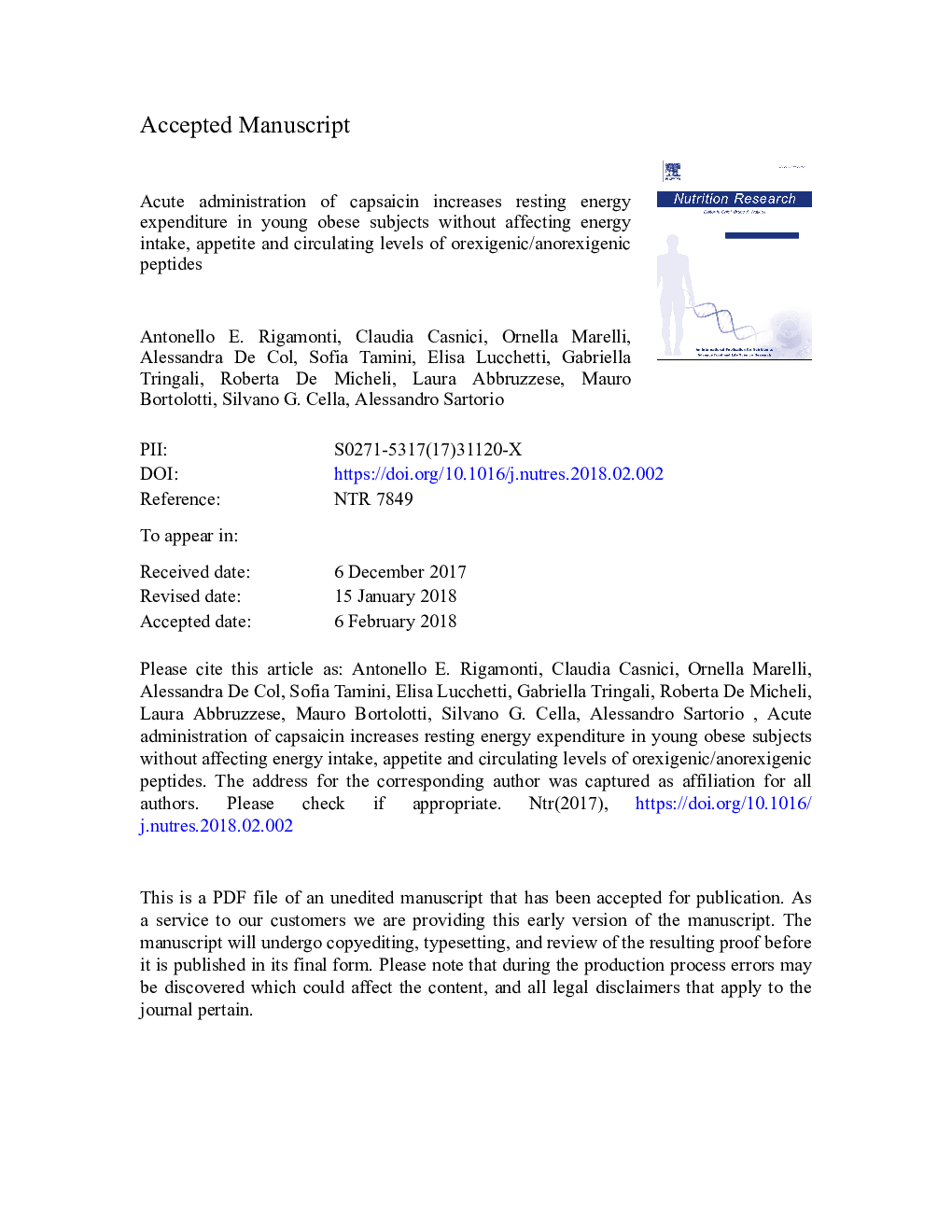| کد مقاله | کد نشریه | سال انتشار | مقاله انگلیسی | نسخه تمام متن |
|---|---|---|---|---|
| 8634216 | 1569093 | 2018 | 29 صفحه PDF | دانلود رایگان |
عنوان انگلیسی مقاله ISI
Acute administration of capsaicin increases resting energy expenditure in young obese subjects without affecting energy intake, appetite, and circulating levels of orexigenic/anorexigenic peptides
ترجمه فارسی عنوان
تزریق حاد کپسایسین باعث افزایش مصرف انرژی در افراد چاق جوانی بدون تأثیر مصرف انرژی، اشتها و سطوح گردش خون پپتیدهای اگزایژن / آنورکسیژن می شود
دانلود مقاله + سفارش ترجمه
دانلود مقاله ISI انگلیسی
رایگان برای ایرانیان
کلمات کلیدی
PYYGLP-1FFMREETRPV1VASResting energy expenditure - استراحت صرف انرژیAppetite - اشتهاanalysis of variance - تحلیل واریانسANOVA - تحلیل واریانس Analysis of varianceEnzyme-linked immunosorbent assay - تست الیزاELISA - تست الیزاEnergy balance - تعادل انرژیfat-free mass - توده بدون چربیfat mass - توده چربیbody mass index - شاخص توده بدنBMI - شاخص توده بدنیCoefficient of Variation - ضریب تغییرObesity - مرض چاقیEnergy intake - مصرف انرژی visual analogue scale - مقیاس آنالوگ بصریtransient receptor potential vanilloid receptor 1 - پتانسیل گیرنده گذرا گیرنده وانیلوئید 1peptide YY - پپتید YYglucagon-like peptide 1 - پپتید مشابه گلوکاگون 1Capsaicin - کپسایسین یا کاپسیسین
موضوعات مرتبط
علوم زیستی و بیوفناوری
بیوشیمی، ژنتیک و زیست شناسی مولکولی
علوم غدد
چکیده انگلیسی
Although capsaicin has been reported to reduce energy intake and increase energy expenditure in an adult (normal weight or overweight) population, thus resulting in a net negative energy balance and weight loss, these beneficial effects have not been investigated in young obese subjects. We hypothesize that capsaicin acutely administered in young obese subjects exerts the same effects on energy balance and that these effects are mediated by changes in gastrointestinal peptides regulating appetite. Thus, the aim of the present study was to evaluate the acute effects of capsaicin (2 mg) or placebo on energy intake, hunger, and satiety in obese adolescents and young adults (female-male ratio: 4:6, age: 21.0 ± 5.8 years; body mass index: 41.5 ± 4.3 kg/m2) provided an ad libitum dinner. Furthermore, circulating levels of some orexigenic (ghrelin) and anorexigenic (glucagon-like peptide 1 and peptide YY) peptides were measured after a meal completely consumed (lunch), together with the evaluation of hunger and satiety and assessment of resting energy expenditure (REE) through indirect computerized calorimetry. When compared to placebo, capsaicin did not significantly change either energy intake or hunger/satiety 6 hours after its administration (dinner). No differences in circulating levels of ghrelin, glucagon-like peptide 1, and peptide YY and in hunger/satiety were found in the 3 hours immediately after food ingestion among obese subjects treated with capsaicin or placebo (lunch). By contrast, the meal significantly increased REE in the capsaicin- but not placebo-treated group (capsaicin: from 1957.2 ± 455.1 kcal/d up to 2342.3 ± 562.1 kcal/d, P < .05; placebo: from 2060.1 ± 483.4 kcal/d up to 2296.0 ± 484.5 kcal/d). The pre-post meal difference in REE after capsaicin administration was significantly higher than that observed after placebo (385.1 ± 164.4 kcal/d vs 235.9 ± 166.1 kcal/d, P < .05). In conclusion, although capsaicin does not exert hypophagic effects, these preliminary data demonstrate its ability as a metabolic activator in young obese subjects.
ناشر
Database: Elsevier - ScienceDirect (ساینس دایرکت)
Journal: Nutrition Research - Volume 52, April 2018, Pages 71-79
Journal: Nutrition Research - Volume 52, April 2018, Pages 71-79
نویسندگان
Antonello E. Rigamonti, Claudia Casnici, Ornella Marelli, Alessandra De Col, Sofia Tamini, Elisa Lucchetti, Gabriella Tringali, Roberta De Micheli, Laura Abbruzzese, Mauro Bortolotti, Silvano G. Cella, Alessandro Sartorio,
